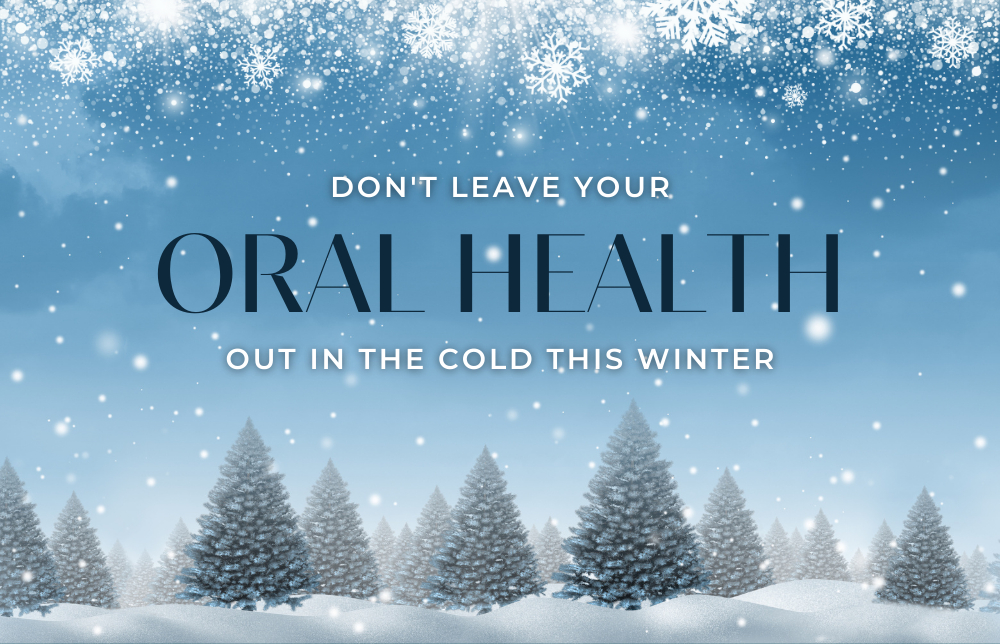
5 Tips to Keep Your Oral Health in Tip-Top Shape This Winter
December 1, 2023
Winter is here and with it comes the drastic change of weather. The cold temperatures can be fun – who doesn’t love a great sleigh ride and hot cocoa on the porch watching the snow fall? But the winter season can take a hefty toll on your oral health.
Cold Weather Brings an Array of Health Issues
Wintertime is known for causing issues like dry skin and irritated throats. But the problems don’t stop there. Your oral health is also affected by the change of weather. Want to keep your oral health in perfect condition this winter season? Follow these tips!
5 Tips to Protect Your Oral Health in the Winter
Tooth Tip #1 –Sensitivity
During cold temperatures, many find that they experience increased tooth sensitivity. This can not only come from foods, but the chilly air outside too! If you’re experiencing tooth sensitivity, there are several solutions to relieve discomfort, including using a toothpaste specially formulated for sensitive teeth, or rising out your mouth with salt water.
Tooth Tip #2 – Cold Sores
The cold weather frequently can cause a weakened immune system. This can lead to cold sores. To prevent a cold sore breakout, start by washing your hands frequently to reduce any germs on them. And remember to keep your hands off of your face and especially your mouth area. If you do feel a cold sore is coming, apply a topical treatment to the area to stop the infection as soon as possible.
Tooth Tip #3 – Exposed Dentin
The enamel is the outside layer of your teeth. If your enamel has started to wear away (which happens normally as we age, and can be exasperated by issues such as teeth grinding), the dentin below can become very sensitive. Without the protection of your enamel, the nerves inside your tooth are more exposed to the elements, putting your oral health at risk.
Tooth Tip #4 – Chapped Lips
One of the most common ailments of the winter season is chapped lips. To protect yourself from painful cracked lips this season, invest in a lip salve with SPF+. In addition, don’t forget that your body moisturizes from the inside out. Make sure you’re drinking plenty of water every day for your lip - and overall - health!
Tooth Tip #5 – Cavity Care
Hands down, the best part of the winter season is all the delicious food. From hot chocolate to candies, winter is the perfect time to enjoy sweets and sugary treats. It’s fine to give into temptation and indulge but remember to brush and floss afterwards to avoid cavities. In addition, always remember to drink plenty of water to help rinse away food particles and bacteria from your mouth. If possible, substitute dental-friendly foods into your winter diet to help with cavity prevention. Foods such as crunchy fruits and vegetables, cheese, and other choices high in calcium, are all perfect for keeping your teeth and gums healthy this winter.
Taking care of your oral health is important. That’s why your association and AMBA want to ensure that your oral health is in tip-top shape this season. Our Dental Plan provides coverage for twice annual cleanings, as well as access for any dentist you want with bigger savings by staying in-network, and – best of all – NO WAITING PERIOD on covered services. Visit www.AMBAdentalvision.com or call 877-556-4578 to enroll today.
RECENT POSTS

The Top Scams to Watch Out for in 2025
In our increasingly digital world, the top scams continue to evolve, with fraudsters developing new and sophisticated ways to
Read More

There’s More Connection Between Your Vision and Heart Health Than Meets the Eye
We all remember the song “Dem Bones,” with lyrics like “The hip bone's connected to the backbone.”
Read More

Fall in Love with a World of Savings This Valentine’s with AMBA Passport
Here’s some fun trivia about Valentine’s Day: it’s believed that Geoffrey Chaucer invented
Read More

How Often Should Older Adults Go to the Dentist?
The eyes may be the gateway to your soul, but oral health is a window into overall health. When it comes to your teeth and
Read More

